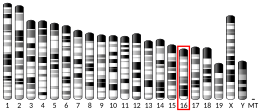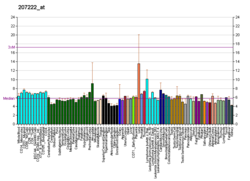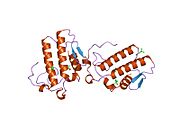Group 10 secretory phospholipase A2 is an enzyme that in humans is encoded by the PLA2G10 gene.
See also
References
- ^ ENSG00000069764 GRCh38: Ensembl release 89: ENSG00000276870, ENSG00000069764 – Ensembl, May 2017
- ^ GRCm38: Ensembl release 89: ENSMUSG00000022683 – Ensembl, May 2017
- "Human PubMed Reference:". National Center for Biotechnology Information, U.S. National Library of Medicine.
- "Mouse PubMed Reference:". National Center for Biotechnology Information, U.S. National Library of Medicine.
- Cupillard L, Koumanov K, Mattei MG, Lazdunski M, Lambeau G (Jul 1997). "Cloning, chromosomal mapping, and expression of a novel human secretory phospholipase A2". J Biol Chem. 272 (25): 15745–52. doi:10.1074/jbc.272.25.15745. PMID 9188469.
- "Entrez Gene: PLA2G10 phospholipase A2, group X".
Further reading
- Schröder HC, Perovic S, Kavsan V, et al. (1998). "Mechanisms of prionSc- and HIV-1 gp120 induced neuronal cell death". Neurotoxicology. 19 (4–5): 683–8. PMID 9745929.
- Sartipy P, Camejo G, Svensson L, Hurt-Camejo E (2002). "Phospholipase A2 Modification of Lipoproteins: Potential Effects on Atherogenesis". Eicosanoids and Other Bioactive Lipids in Cancer, Inflammation, and Radiation Injury, 5. Advances in Experimental Medicine and Biology. Vol. 507. pp. 3–7. doi:10.1007/978-1-4615-0193-0_1. ISBN 978-1-4613-4960-0. PMID 12664556.
- Murakami M, Kudo I (2004). "New phospholipase A(2) isozymes with a potential role in atherosclerosis". Curr. Opin. Lipidol. 14 (5): 431–6. doi:10.1097/00041433-200310000-00003. PMID 14501581. S2CID 28202085.
- Lennon G, Auffray C, Polymeropoulos M, Soares MB (1996). "The I.M.A.G.E. Consortium: an integrated molecular analysis of genomes and their expression". Genomics. 33 (1): 151–2. doi:10.1006/geno.1996.0177. PMID 8617505.
- Mavoungou E, Georges-Courbot MC, Poaty-Mavoungou V, et al. (1997). "HIV and SIV envelope glycoproteins induce phospholipase A2 activation in human and macaque lymphocytes". J. Acquir. Immune Defic. Syndr. Hum. Retrovirol. 16 (1): 1–9. doi:10.1097/00042560-199709010-00001. PMID 9377118.
- Yokota Y, Higashino K, Nakano K, et al. (2000). "Identification of group X secretory phospholipase A(2) as a natural ligand for mouse phospholipase A(2) receptor". FEBS Lett. 478 (1–2): 187–91. doi:10.1016/S0014-5793(00)01848-2. PMID 10922494. S2CID 28188560.
- Morioka Y, Saiga A, Yokota Y, et al. (2000). "Mouse group X secretory phospholipase A2 induces a potent release of arachidonic acid from spleen cells and acts as a ligand for the phospholipase A2 receptor". Arch. Biochem. Biophys. 381 (1): 31–42. doi:10.1006/abbi.2000.1977. PMID 11019817.
- Degousee N, Ghomashchi F, Stefanski E, et al. (2002). "Groups IV, V, and X phospholipases A2s in human neutrophils: role in eicosanoid production and gram-negative bacterial phospholipid hydrolysis". J. Biol. Chem. 277 (7): 5061–73. doi:10.1074/jbc.M109083200. PMID 11741884.
- Hanasaki K, Yamada K, Yamamoto S, et al. (2002). "Potent modification of low density lipoprotein by group X secretory phospholipase A2 is linked to macrophage foam cell formation". J. Biol. Chem. 277 (32): 29116–24. doi:10.1074/jbc.M202867200. PMID 12021277.
- Osterström A, Dimberg J, Fransén K, Söderkvist P (2002). "Expression of cytosolic and group X secretory phospholipase A(2) genes in human colorectal adenocarcinomas". Cancer Lett. 182 (2): 175–82. doi:10.1016/S0304-3835(02)00081-2. PMID 12048163.
- Pan YH, Yu BZ, Singer AG, et al. (2002). "Crystal structure of human group X secreted phospholipase A2. Electrostatically neutral interfacial surface targets zwitterionic membranes". J. Biol. Chem. 277 (32): 29086–93. doi:10.1074/jbc.M202531200. PMID 12161451.
- Strausberg RL, Feingold EA, Grouse LH, et al. (2003). "Generation and initial analysis of more than 15,000 full-length human and mouse cDNA sequences". Proc. Natl. Acad. Sci. U.S.A. 99 (26): 16899–903. Bibcode:2002PNAS...9916899M. doi:10.1073/pnas.242603899. PMC 139241. PMID 12477932.
- Wooton-Kee CR, Boyanovsky BB, Nasser MS, et al. (2004). "Group V sPLA2 hydrolysis of low-density lipoprotein results in spontaneous particle aggregation and promotes macrophage foam cell formation". Arterioscler. Thromb. Vasc. Biol. 24 (4): 762–7. CiteSeerX 10.1.1.496.1425. doi:10.1161/01.ATV.0000122363.02961.c1. PMID 14962950.
- Mounier CM, Ghomashchi F, Lindsay MR, et al. (2004). "Arachidonic acid release from mammalian cells transfected with human groups IIA and X secreted phospholipase A(2) occurs predominantly during the secretory process and with the involvement of cytosolic phospholipase A(2)-alpha" (PDF). J. Biol. Chem. 279 (24): 25024–38. doi:10.1074/jbc.M313019200. PMID 15007070. S2CID 19214808.
- Gerhard DS, Wagner L, Feingold EA, et al. (2004). "The status, quality, and expansion of the NIH full-length cDNA project: the Mammalian Gene Collection (MGC)". Genome Res. 14 (10B): 2121–7. doi:10.1101/gr.2596504. PMC 528928. PMID 15489334.
- Masuda S, Murakami M, Takanezawa Y, et al. (2005). "Neuronal expression and neuritogenic action of group X secreted phospholipase A2". J. Biol. Chem. 280 (24): 23203–14. doi:10.1074/jbc.M500985200. PMID 15781456.
| PDB gallery | |
|---|---|
This article on a gene on human chromosome 16 is a stub. You can help Misplaced Pages by expanding it. |







